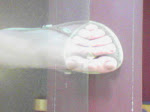I'm a bit more than halfway through Kubrick's film, which I'm liking far more than I thought I would. It's a bit like a circus, bit like a ballet in the beginning, which is beautiful and great, and MacDowell's perfect as Alex. I also quite like Michael Bates, who plays the Monty Pythonesque prison guard. Genius.
But here's the thing: I know women are mistreated in the book, and Kubrick's only being true to the story, but I am a bit sick of women as objects of rape and exploitative fantasy. You know what would be really different? If one of these no-holds-barred filmmakers did a movie where the woman was the one who sexualized and objectified the man. Sure, we've had it before, but only in the romantic sense. Not in the power/violence mindset. I suppose you could argue it's because women aren't like that. Well, I don't think most men are "like that" either, but there are exceptions to the rule. I'd prefer there to be none of it, period, but since the demeaning of women seems to be a favorite pasttime of these books and films (and sure, you could say, it's there to show the grotesquerie of that world, it's not really, it's there because some guy's getting off on it, and there are plenty of actresses who will fill the role; most of it's gratuitous).
And now onto the Monthly's article on quirk.
The article has a point. And the point is, those who do not share my aesthetic values are annoying. Let me demean them now. And clump them together. Because comparing sly, absurd, brilliant Arrested Development with precious and coy Miranda July is wrong. I understand the quirk impulse, especially in storytelling. It has two benefits: it needs no explanation (a priori) and it makes your work a little different. Depending on who you are and what you're doing, you can use the quirk for good or evil. AD used the quirk for good. I'm not going to talk about July because I haven't read her stories, and I'm a bit predisposed to dislike her because of how she mugs for the camera, but that's not really fair, so I'll hold off.
Anyhow. Poor Wes Anderson. Amsden's article on him in NYMag gives you a glimpse into it. He's not affecting. Like AD, he's just trying to write a great and funny story that entertains and jabs at your preconceived notions the best way he knows how. He's not perfect, but he's not bullshitting us either. So while I too found Zissou dull (actually, I'm not a huge fan, overall), I'm still excited about seeing The Darjeeling Limited. I like India. His movies are pretty. And the trailer looks good. I have high hopes.
In a time dominated by the highly trivial and yet inescapably relevant Internet, an American president who's practically illiterate, and the Red Sox winning the World Series, quirk is an understandable response. If we fetishize the small and details, we can ignore just how colossally weird the world is.
Dickens was a little quirky, by the way. As was Cervantes.
I suppose my point is, any author who uses the word "fescue" in an article instead of grass can't expect to be taken seriously, unless his whole theory rests on some wacked argument that pretention is far more acceptable a gamut than quirk. I think not, my good sir.
Monday, September 24, 2007
Subscribe to:
Post Comments (Atom)
In summing up, I wish I had some kind of affirmative message to leave you with. I don't. Would you take two negative messages?
-- Woody Allen

No comments:
Post a Comment